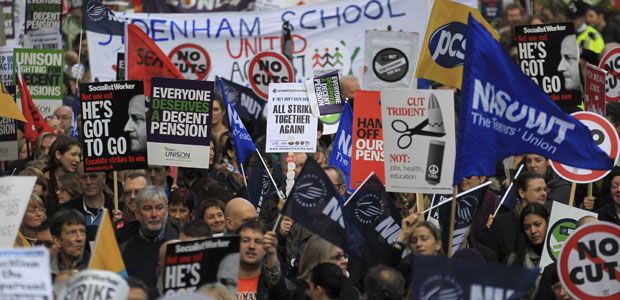Public sector pensions reforms ‘won’t save money’
The government’s latest reforms to public sector pensions will not benefit the taxpayer in the long run, according to the Institute for Fiscal Studies think tank.

With fears of another strike by public sector unions as early as March, research by the IFS says the government’s decision to increase the pension age will be offset by its plan to boost the retirement incomes of those on low salaries.
It is thought that more than a million public sector employees, including teachers, civil servants and council staff, could take strike action over pensions in a matter of weeks. There was a one-day strike on 30 November, but this time there could be industrial action over a longer period.
Negotiations
The government reached agreement with some unions in December, but Unite, the PCS civil servants’ union and the NUT and NASUWT teaching unions rejected the offer.
Ministers are determined to bring down the cost of pensions as part of their £81bn austerity programme of spending cuts and tax increases to reduce the deficit in the public finances.
If the objective is to save money, then this latest set of reforms is not achieving that objective. Carl Emmerson, IFS
Public sector workers will be expected to retire later, with many of them making bigger contributions to their pension pots. But the IFS says this will not cut costs over the longer term because of the relatively generous treatment of low-paid employees.
Lower earners
The research says: “In general, lower earners in the public sector will actually get a more generous pension as a result of the recently announced reforms. That is, they will be able to retire at age 65 with a higher annual pension than they would receive under current arrangements. This results from the move from final salary to career average schemes and the particular changes to accrual and indexation rules.
“Conversely, higher earners are likely to lose out. The move from final salary to career average relatively penalises those who see big increases in their earnings over time.”
Carl Emmerson, deputy director of the IFS and co-author of the paper, told Channel 4 News: “If the objective is to save money, then this latest set of reforms is not achieving that objective. There are certainly things to be welcomed in the government’s package, but they do not deliver a net taxpayer saving.”
Spending review
In his October 2010 spending review, Chancellor George Osborne announced that, to save money, in future pensions would be aligned with the consumer prices index measure of inflation, rather than the retail prices index. The IFS says this will cut costs substantially.
The research also says that the current public sector pay freeze and forthcoming two years of 1 per cent increases will help to re-align public sector pay with salaries in the private sector. As a result of the 2008-09 recession, private sector pay fell quickly, but public sector pay held up.
The IFS says lower earners are paid more in the public sector than higher earners, relative to the private sector, adding: “The government’s current policy of relatively protecting lower earners from the pay squeeze will increase differences between public and private sectors.”
A Treasury spokesman said: “Reforms to public service pensions will save the taxpayer tens of billions of pounds over the next few decades and significantly improve the long-term fiscal sustainability of this country.
“These savings are achieved by a number of changes, including asking people to work longer, pay higher contributions and changing the way pensions keep pace with inflation in retirement. These have to be seen as a whole package and were negotiated as such. This analysis only looks at one of these elements and as such is partial and misleading.”